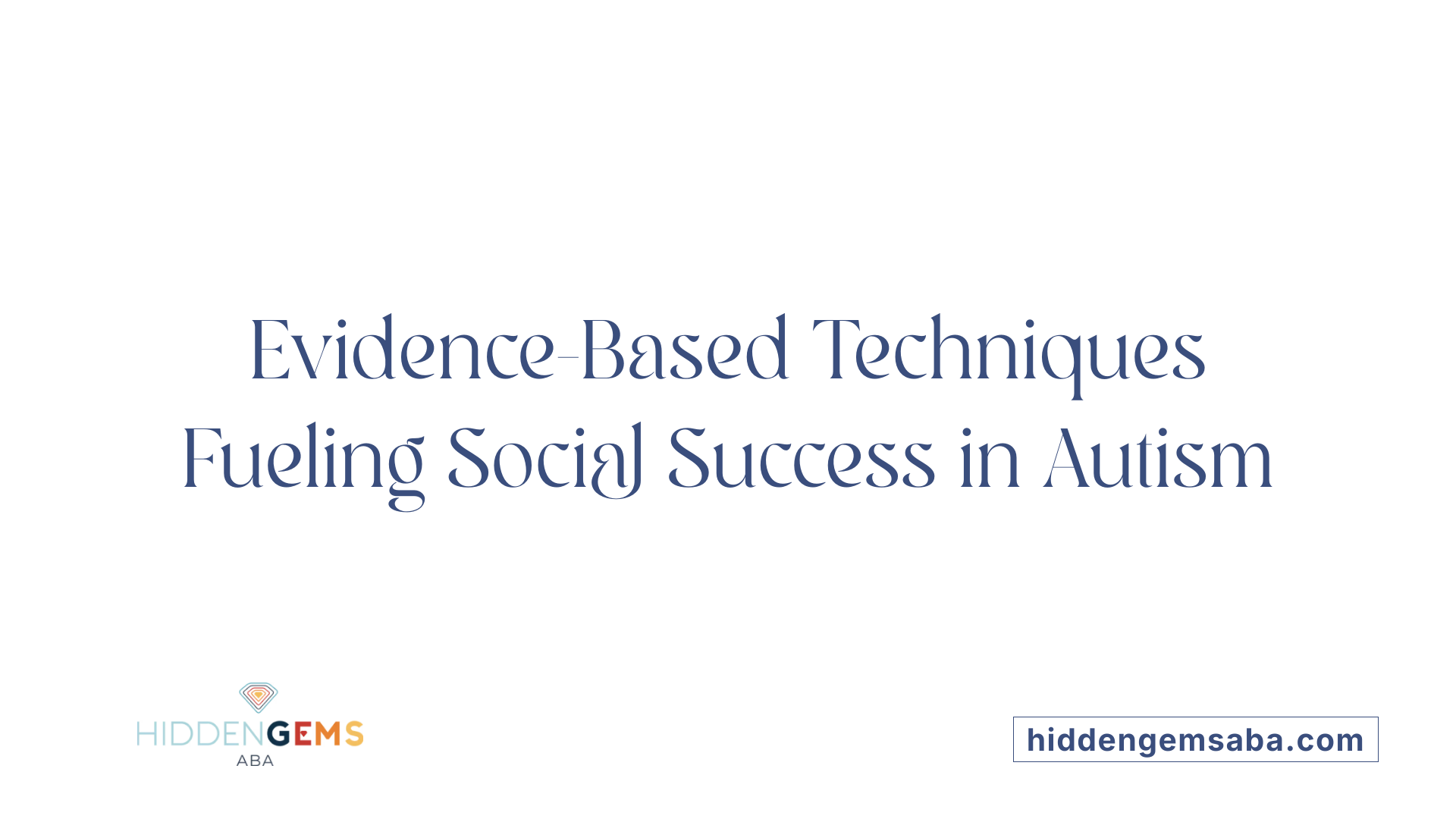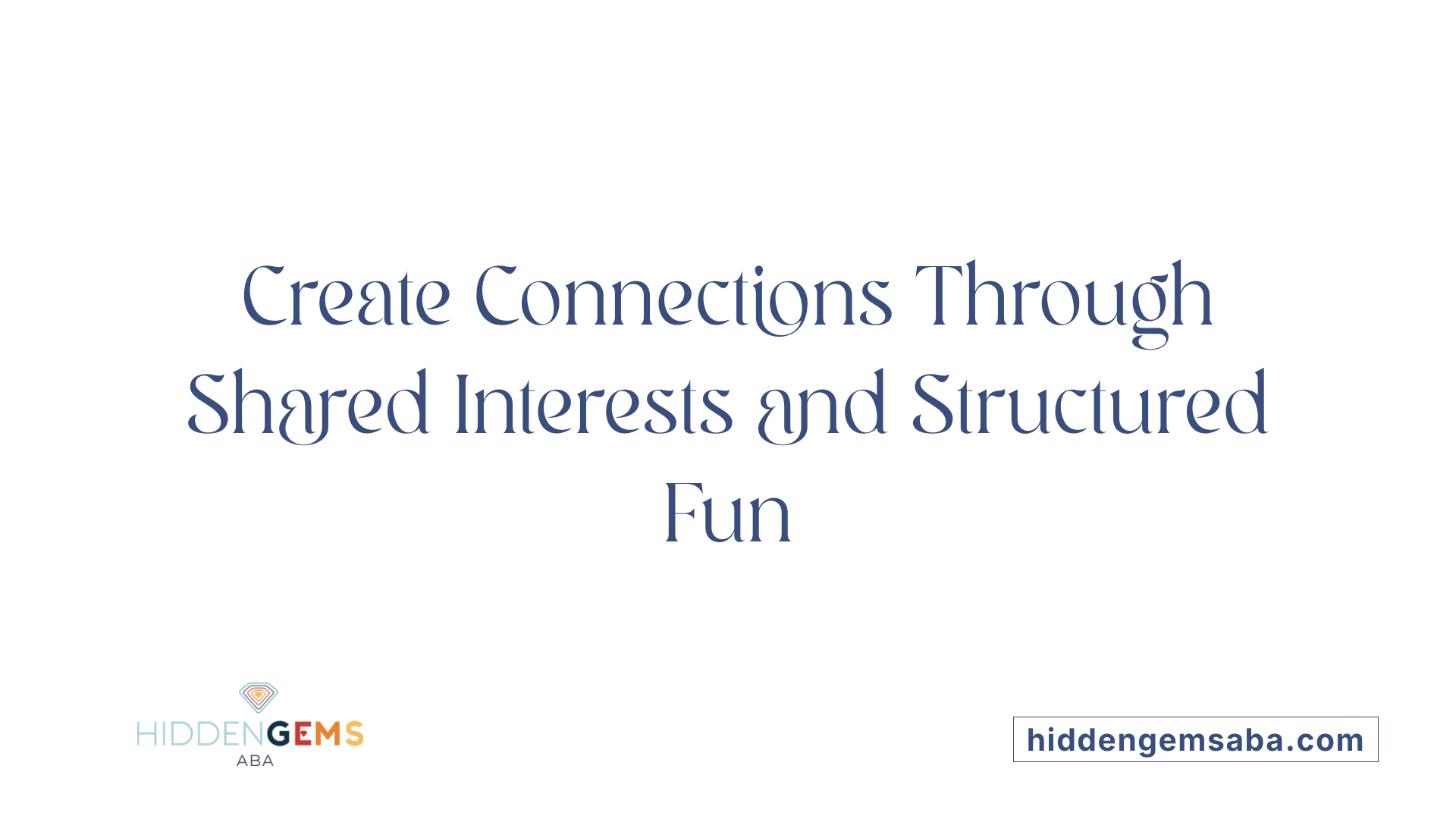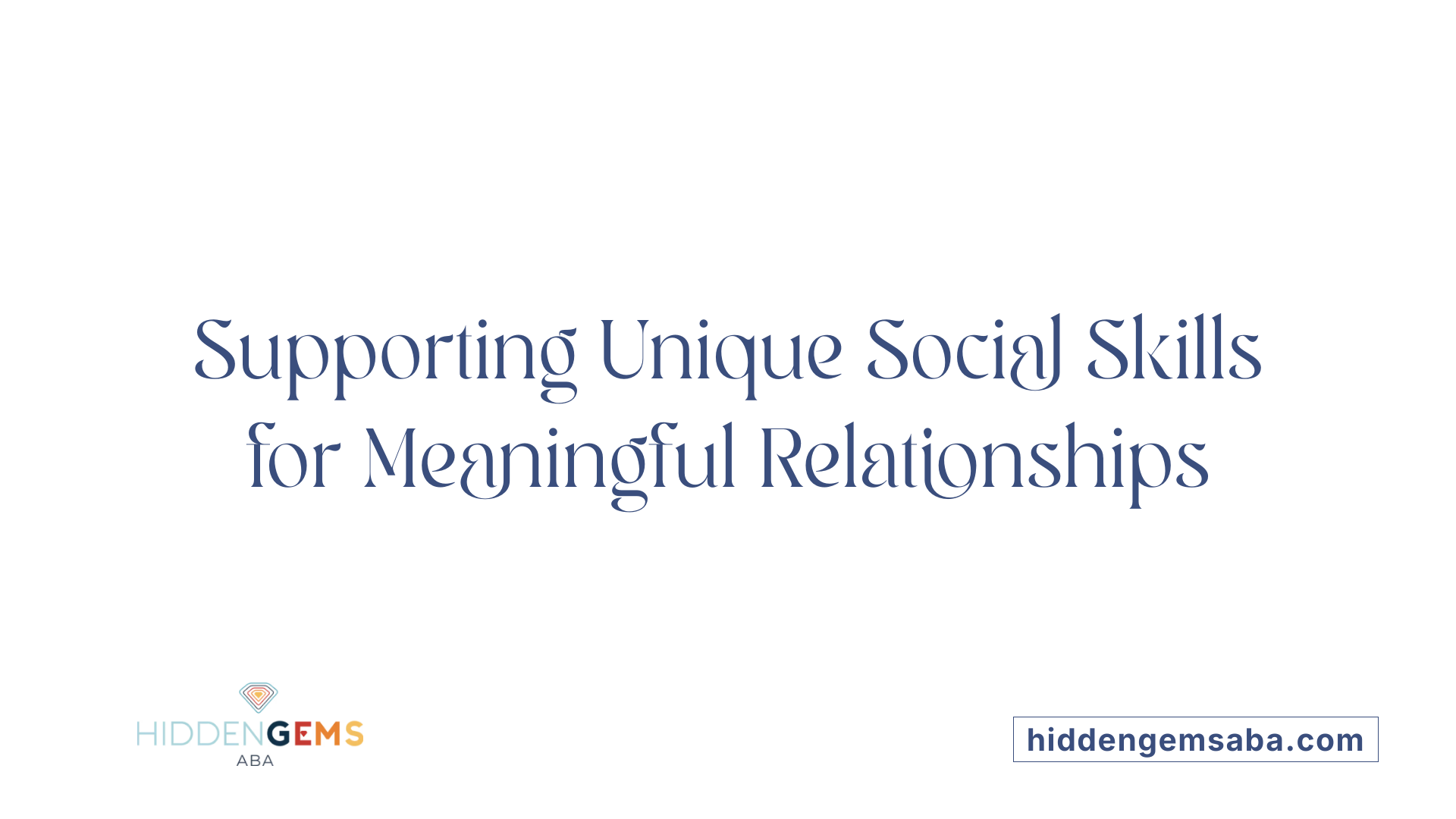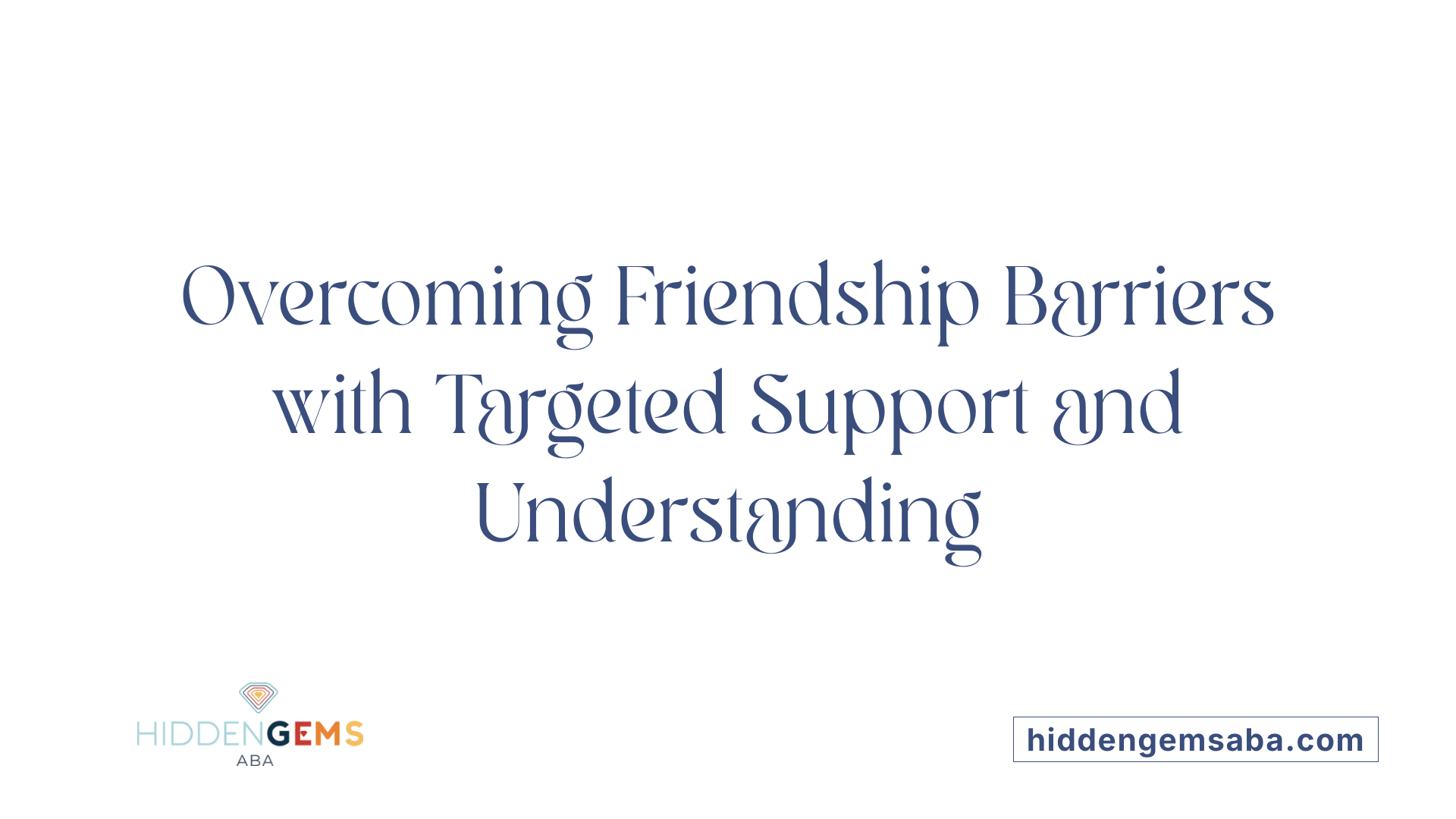Understanding and Supporting Social Connections in Autism
Friendship development presents unique challenges for individuals on the autism spectrum due to differences in social communication and interaction. Recognizing these challenges and applying tailored, evidence-based strategies can significantly improve social engagement, helping autistic individuals forge meaningful relationships and enjoy the numerous benefits of friendship. This article explores effective frameworks, interventions, and supportive practices designed to foster friendship skills, emphasizing the importance of patience, inclusivity, and individualized approaches.
Assessing Social Skills and Personalizing Interventions
When it comes to helping children with autism develop better social skills and form friendships, accurate assessment is essential. Different methods can be used to understand each child's unique social functioning.
What evidence-based methods are effective for enhancing friendship development in individuals with autism?
Effective strategies include structured social skills programs like PEERS® that teach concrete skills such as initiating conversations, managing conflicts, and making friends. These programs often incorporate real-world practice and peer interactions, making the learning practical and easier to generalize.
Naturalistic teaching approaches are also important. These involve creating opportunities for children to learn social skills through everyday activities, like shared hobbies or group games. Peer pairing is another method where children are matched with buddies who can model and support appropriate social behaviors.
Adult-mediated coaching within supportive environments, such as classrooms or homes, provides structured guidance that helps children understand social cues and respond appropriately. Activities based on shared interests, such as art, gaming, or cosplay, encourage friendship building by creating common ground.
Importantly, fostering friendships based on mutual acceptance of differences helps children feel valued and understood. Emphasizing understanding and appreciation of each other's perspectives nurtures genuine connections.
Distinguishing between skill acquisition and performance deficits
Assessment should identify whether challenges stem from not knowing how to perform a social skill (skill deficits) or from difficulties in applying skills in real-life situations (performance deficits). This distinction guides intervention focus.
Tailoring interventions to individual needs
Interventions must be customized based on assessment results. For some children, social skills training might focus on recognizing emotions or turn-taking, while others may benefit from training in initiating conversations or managing stress during social interactions. Continual monitoring of progress helps in adjusting strategies and ensuring interventions remain relevant.
Overall, combining formal assessment tools with tailored, evidence-based methods creates a personalized path to improving social skills and fostering meaningful friendships among children and young people with autism.
Utilizing Evidence-Based Social Skills Interventions

Why are structured social skills programs important for children with autism?
Structured programs serve as foundational tools in teaching children with autism essential social skills. Evidence-based methods like Applied Behavior Analysis (ABA) are especially effective, using consistent reinforcement to help children learn appropriate social behaviors. These programs often involve step-by-step instructions, visual supports, and clear expectations, enabling children to gradually develop skills such as initiating conversations, sharing interests, and understanding social cues.
Programs like PEERS® (Program for the Education and Enrichment of Relational Skills) and the Westmead Feelings Program offer comprehensive curricula that focus on social competence, emotional recognition, and relationship building. Implementing these frameworks within school or community settings helps promote meaningful interactions and long-term social integration.
How do peer-mediated interventions and social groups facilitate social development?
Peer-mediated interventions involve training peers, whether classmates or group members, to model and support social interactions. This approach helps children with autism practice social skills in natural settings, fostering authentic relationships. Social groups, such as Autism Social Skills Groups, are designed to create safe, guided environments where children can learn and practice social behaviors through structured activities.
These groups are often led by trained professionals and incorporate evidence-based techniques like role-playing, social stories, and structured games. Participation boosts understanding of social cues, turn-taking, and cooperation while giving children opportunities to develop friendships based on shared interests.
What role do social stories, role-playing, and video modeling play in improving social interactions?
Social stories are personalized narratives that teach children social norms and appropriate responses in specific situations. They simplify complex social concepts into visual and easy-to-understand language, helping children anticipate and understand social interactions.
Role-playing allows children to rehearse social scenarios in a supportive setting. It helps them practice responses, understand others’ feelings, and build confidence in real-life situations.
Video modeling, particularly video self-modeling, is highly effective in demonstrating successful social behaviors. Children watch videos of themselves or peers performing social tasks correctly, which reinforces learning and motivation. This method provides visual reinforcement and clear examples of expected social actions.
Employing these techniques collectively supports children with autism in acquiring and practicing social skills essential for establishing friendships and meaningful social connections.
Building Friendships through Interest-Based and Structured Activities

How can parents and caregivers foster friendships in children with autism?
Parents and caregivers play a vital role in helping children with autism build meaningful social connections. One effective way is by creating inclusive settings where children with autism can interact comfortably with typically developing peers. This can include integrating them into regular classrooms and encouraging social programs like Lunch Buddies or peer mentorship initiatives.
Explicitly teaching social skills is another important step. This involves activities such as role-playing, practicing conversations, and using visual aids like social stories to help children understand social norms and cues. Supporting alternative communication methods, including sign language or augmentative devices, ensures children can express themselves.
Modeling positive interactions and praise for social efforts boost confidence and reinforce good social behaviors. Educating peers about autism fosters understanding, acceptance, and reduces misconceptions. This creates a more welcoming environment that promotes friendship.
Active parental involvement, like organizing playdates, volunteering at social events, and advocating for appropriate support programs, enhances opportunities for friendship development. Supportive teachers and trained adults can assist through social skills coaching—using peer-mediated strategies or group activities—to practice interacting in safe, structured contexts.
Patience is essential, as developing friendships can take years. Emphasizing ongoing progress and celebrating small successes helps children feel valued and motivated. Long-term commitment and continued support are crucial, as consistent efforts over time lead to stronger social skills and greater independence, ultimately fostering lasting friendships.
Understanding Autism-Specific Social Skills and How to Support Them

What social skills are specific to autism, and how can these be taught or supported?
Children and young people with autism often experience challenges in social functioning, which impact their ability to make and maintain friendships. Autism-specific social skills include understanding social cues such as facial expressions, body language, and tone of voice. They may also struggle with initiating and responding to social interactions, sharing enjoyment, reading non-verbal cues, and taking perspectives.
Despite these difficulties, many children with autism have the desire for social involvement but lack the appropriate skills. Effective support involves targeted interventions tailored to the individual child's needs. Strategies include using visual supports like social stories, which provide clear, literal instructions about social concepts. Role-playing and social narratives help children practice real-life interactions in a safe setting.
Video modeling, especially video self-modeling, proves highly effective by demonstrating successful social behaviors and building confidence. Peer-mediated interventions are another valuable approach, where trained peers facilitate interaction, making social skills practice more natural. Recognizing and understanding emotions through activities that identify feelings in pictures or stories fosters emotional awareness, which is crucial for social interaction.
Assessment of a child's social skills is essential to identify specific deficits and strengths. Based on this, intervention plans are personalized, often combining explicit teaching with environmental modifications. Reinforcement, such as praise for sharing or taking turns, encourages skill development. Incorporating structured social skills groups led by professionals provides a supportive environment to learn and practice. Regular evaluation and adaptation of these strategies ensure progress and skill retention.
In summary, supporting social skills in children with autism requires a systematic approach combining assessment, individualized strategies, and consistent practice in daily settings. These efforts can significantly improve their social interactions, fostering meaningful friendships and enhancing overall well-being.
Addressing Challenges in Friendship Formation and Their Solutions

What challenges do autistic individuals face in forming friendships, and how can these challenges be addressed?
Children and young people with autism often face difficulties in building and maintaining friendships due to a variety of social and sensory challenges. These include differences in social communication, such as difficulty reading body language, understanding unwritten social rules, initiating interactions, and responding appropriately. Sensory sensitivities may make certain environments overwhelming, causing discomfort during social activities.
Additionally, many autistic individuals experience social anxiety or exhaustibility, which can make social situations draining and less appealing. They may also struggle with perspective-taking and sharing interests, which are crucial for developing bonds of friendship. These challenges can contribute to misunderstandings, social rejection, and feelings of loneliness.
Societal misconceptions and stereotypes further complicate these issues, as some peers may lack understanding or acceptance, leading to social exclusion. The 'double empathy problem'—the idea that communication gaps are mutual—also highlights that neurotypical social norms may not align with autistic social styles, making interaction more complex.
To address these challenges, targeted interventions are essential. Social skills programs adapted for autism—such as social stories, role-playing, and video modeling—can improve understanding and comfort in social interactions. Peer-mediated interventions, where neurotypical peers are trained to facilitate inclusive play and conversations, promote naturalistic social learning.
Creating safe, structured environments like social skills groups or autism-friendly spaces offers low-pressure opportunities for autistic individuals to practice social skills and develop friendships.
Supporting self-acceptance and emphasizing shared interests can foster meaningful connections. Online communities and interest-based clubs can also serve as effective platforms where autistic people can connect with others who share their passions, reducing social anxiety.
Furthermore, societal efforts to increase awareness and understanding of autism—by educating peers and families—are vital. These initiatives help dismantle stereotypes, promote patience and empathy, and create more welcoming spaces for authentic relationships.
In summary, while autistic individuals face unique hurdles in forming friendships, a combination of tailored support, community engagement, and societal acceptance can significantly improve their social experiences. Encouraging a compassionate, understanding environment allows autistic people to develop lasting, fulfilling friendships that enhance their overall well-being.
Supporting Social Skills Development and Measuring Outcomes

What resources and tools are available for measuring and supporting friendship skills in autistic populations?
Supporting children and young people with autism in developing social and friendship skills involves a variety of assessment tools and targeted interventions. Standardized measures such as the Autism Social Skills Profile (ASSP) help identify specific social difficulties and strengths, providing a clear foundation for tailored support.
Observation-based tools are also commonly used by teachers and therapists to monitor social interactions in natural settings, giving insight into how a child engages with peers over time. Parent and peer reports contribute valuable perspectives, capturing social functioning within familiar environments and social contexts.
One prominent evidence-based program is the UCLA PEERS® (Programs for the Education and Enrichment of Relational Skills). This structured, parent-assisted social skills training program targets key areas such as initiating conversations, using humor appropriately, managing conflicts, and navigating online social interactions. PEERS® has proven effective when delivered in person or via telehealth, making it accessible across different settings.
In addition to formal programs, various resources support explicit social skills instruction. Visual supports like social stories, emotion charts, and picture cards help children recognize and understand emotions and non-verbal cues. Role-playing exercises, video modeling—including self-modeling where children watch videos of themselves demonstrating social skills—and digital games create engaging ways to practice social interactions in safe environments.
Organizations dedicated to autism support often provide downloadable social scripts, activity guides, and visual aids that assist caregivers and educators in teaching social norms and friendship concepts. These tools are designed to help children learn appropriate communication, emotional regulation, and friendship skills.
Combining these assessment methods and resources allows practitioners and parents to implement comprehensive, individualized support plans. Continuous monitoring and evaluation effectively measure progress, enabling adjustments that promote meaningful social connections for autistic individuals.
Harnessing Insights into Autistic Social Experiences for Better Relationship Building
How can insights into autistic social experiences inform relationship-building techniques?
Understanding the social experiences of autistic individuals provides valuable guidance on how to foster meaningful connections. Many autistic people express a strong desire for friendships and social involvement, though they often face challenges in traditional social settings due to difficulties in reading body language, understanding unspoken rules, and managing sensory sensitivities.
Recognizing that autistic individuals usually want social interaction but lack the typical social skills allows caregivers and educators to tailor approaches accordingly. For example, explicit instruction in social cues, role-playing, and visual supports like social stories can make social concepts clearer. These strategies help autistic children develop the skills needed to initiate conversations, turn-taking, and sharing, which are foundational for friendships.
Supporting self-advocacy plays a crucial role. When autistic individuals are empowered to express their needs and boundaries, it builds trust and promotes authentic relationships. Creating environments that stress acceptance, reliability, and predictability helps autistic people feel safe and valued. Structured social activities, whether through social skills groups, peer-mediated interventions, or supported playdates, facilitate positive interactions in settings sensitive to their needs.
Furthermore, understanding that many autistic individuals prefer routines and familiar environments guides us in planning social activities that are comfortable and engaging. When social interactions are based on shared interests and achievable goals, they are more likely to develop into genuine, lasting connections.
In sum, insights into the social worlds of autistic individuals help us develop inclusive, effective relationship-building techniques. These approaches respect their unique communication styles, reinforce their independence, and foster bonds rooted in authenticity, understanding, and mutual respect.
| Aspect of Autism | Social Strategy | How It Supports Relationship Building | Additional Notes |
|---|---|---|---|
| Communication Styles | Use visual aids, social stories | Clarifies social expectations and reduces anxiety | Tailors social cues to individual needs |
| Social Sensitivities | Create predictable routines | Builds trust and comfort in interactions | Adjust environments to sensory preferences |
| Expressed Desire for Connection | Promote shared interests, joint activities | Encourages genuine bonds based on mutual passions | Interest-based groups increase accessibility |
| Self-Advocacy | Teach expressing needs & boundaries | Fosters mutual respect and understanding | Empowers autistic individuals in social settings |
| Environment & Setting | Use structured, safe spaces | Supports confidence and reduces overwhelm | Incorporate sensory-friendly features |
| Role of Educators & Peers | Provide guided interactions, peer support | Facilitates natural opportunities for friendship | Peer mediation can reduce social barriers |
Recognizing the unique ways autistic individuals experience and translate social cues allows us to design more effective, inclusive relationship-building methods. This understanding promotes acceptance, strengthens social competence, and ultimately enhances their quality of life through genuine connections.
Fostering Long-Lasting Friendships in Autism
Developing friendship skills within the autism spectrum intertwines comprehensive assessment, tailored interventions, inclusive practices, and ongoing support. Recognizing autistic individuals' unique social experiences and equipping them with practical tools and trusted environments can lead to meaningful, lasting relationships. Patience and understanding from caregivers, educators, peers, and society are vital, ensuring that friendship development benefits from authentic connections, mutual respect, and shared interests, ultimately enriching the lives of autistic people and their communities.
References
- Autism and friendships
- Making (and Keeping) Friends: A Model for Social Skills ...
- Friendships
- Making friends - a guide for autistic adults
- Friendship interventions and measurements in children ...
- Navigating Autism Friendship Challenges
- Autistic Social Skills: Understanding Organic ...
- Autism and Friendship: 8 Steps to Help Your Kid Make ...
- Friendship skills - Life Skills Resource
- 10 Amazing Resources for Social Skills Activities for Autism




